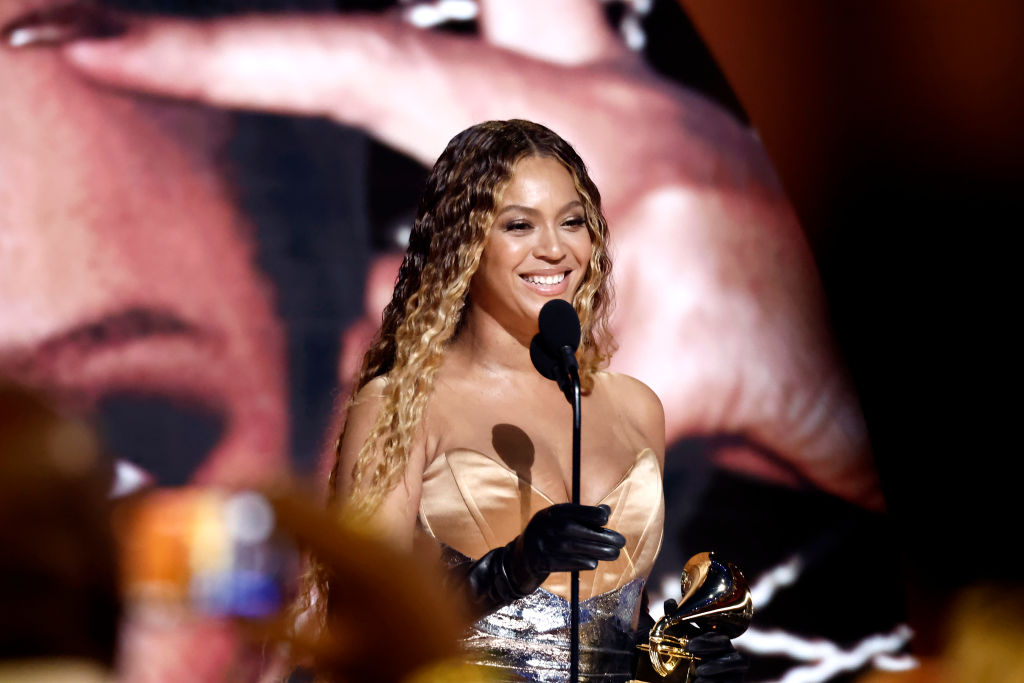
If you tuned into the Grammys last night without realizing what you were watching, you might have mistaken the program for a three-and-a-half hour Beyoncé tribute. Seemingly every celebrity in the Crypto.com Arena basked in her presence, fawned over her, and thanked her for being the artist of their lifetime in their speeches. But the Recording Academy has long ignored Beyoncé when it comes to the Big Four Categories—Best New Artist, Song of the Year, Record of the Year, and Album of the Year. She’s only won once in these categories—in 2010, for “Single Ladies (Put a Ring On It)”—and has lost all four times she was nominated for the coveted Album of the Year trophy, including last night.
At Sunday night’s ceremony, Beyoncé was expected by many to win with her incredible sonic masterpiece Renaissance, her 2022 album that topped many a best-of-year list. Earlier in the night, she had broken a major record, becoming the artist with the most Grammy awards ever after bringing her total up to 32 trophies with four new wins. There was a noticeable hush in the room right after host Trevor Noah announced the nominees for the night’s biggest award. When Harry Styles was announced as the winner, there was what appeared to be a brief pause before the room erupted into applause. Over on Twitter, meanwhile, things immediately devolved into chaos as critics and fans expressed a range of reactions to the perceived snub for Beyoncé and Renaissance.
Among those emotions were anger, frustration, and resignation at the Recording Academy’s history of overlooking Black artists, and specifically Black women, in this major category. In Beyoncé’s case, each of the four times she has been nominated for Album of the Year, she has lost to a white artist whose album many argued was less culturally significant than hers. (Even Adele famously tried to reject her own win over Beyoncé’s Lemonade in 2017.)
Styles’ album Harry’s House was well-received by critics, who hailed him for stepping up his production, with an average score of 83 on Metacritic. In his acceptance speech, he said that he was very grateful for the award, and that “This doesn’t happen to people like me very often.” This remark prompted many to ask what meant by “people like [me,]” given his privilege as a white, cisgender man and the irony of how infrequently this kind of win happens to, well, people like Beyoncé.
The Recording Academy’s repeated awarding of other artists over Beyoncé has not taken place in a vacuum. Only three Black women have won Album of the Year in the ceremony’s 65-year history, the last time being when Lauryn Hill won for The Miseducation of Lauryn Hill in 1999. Before Hill, Natalie Cole won for Unforgettable…with Love in 1992 and Whitney Houston won for the soundtrack to The Bodyguard in 1994. Throughout the history of the awards, there have been other upsets with Black women nominated for Album of the Year. TLC’s Fanmail lost to Santana in 2000; U2 beat out Mariah Carey’s Emancipation of Mimi in 2006; and Janelle Monáe’s Dirty Computer lost to Kacey Musgraves’ Golden Hour in 2019. Since Hill’s win in 1999, Beyoncé has been the frontrunner for the prize after submitting her albums I Am… Sasha Fierce, Beyoncé, Lemonade, and Renaissance.
When Beyoncé failed to win for her self-titled 2013 surprise album, with the award instead going to Beck for Morning Phrase, many pointed to how her album had disrupted the music industry with its unconventional release strategy and beaten streaming records on top of being a cohesive, thoughtful album. Her sixth studio album, Lemonade, was a culture-shifting moment. The single “Formation” generated controversy because of the song and video’s staunchly anti-police perspective. She performed the song at the Super Bowl Halftime Show with her backup dancers dressed in an homage to the Black Panthers, inspiring debate on the world’s largest stage. Her most recent album, Renaissance, is an amalgamation of the Black queer experience in all of its joy and sonic treasures.
The Recording Academy has come under fire in recent years for issues relating to gender and diversity. The institution’s leaders have vowed to make changes on the diversity and inclusion front, including by expanding the membership of its 12,000-plus body of voting members in an effort to diversify its ranks, as well as shaking up its leadership. Changing the direction of a ship that big is, as we’ve witnessed with other entertainment industry efforts over at the Academy of Motion Pictures Arts and Sciences, among others, almost always a slow, creaking process. There is, clearly, still much work to be done.
More Must-Reads from TIME
- Cybersecurity Experts Are Sounding the Alarm on DOGE
- Meet the 2025 Women of the Year
- The Harsh Truth About Disability Inclusion
- Why Do More Young Adults Have Cancer?
- Colman Domingo Leads With Radical Love
- How to Get Better at Doing Things Alone
- Michelle Zauner Stares Down the Darkness
Write to Moises Mendez II at moises.mendez@time.com